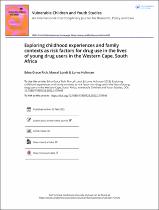Exploring childhood experiences and family contexts as risk factors for drug use in the lives of young drug users in the Western Cape, South Africa
Abstract
The use of drugs amongst adolescents and youth has become a global phenomenon and South Africa is no exception. This paper aims to explore the familial contexts and childhood experiences leading up to the drug-taking pathways of young drug users. A qualitative approach was utilized to gather demographic from a purposive sample of 41 young (14–19 years) drug users, at five drug treatment centres in the Western Cape of South Africa. Additionally, participants could agree to participate in an in-depth interview or to provide a written life history account. A thematic data analysis was applied, and the results uncovered a range of family-related risk factors such as family structure (single motherhood and absent fatherhood), and other negative family functioning and practices such as troubled parent-child relationships, poor family communication/interactions, parental/family substance abuse, and conflict-ridden, stressful and often violent and abusive family situations. The findings suggest that prevention initiatives should focus on strengthening family functioning by reducing high conflict, stress, violent and abusive family situations, as well as aim to enhance the caregiver-child relationship. Prevention strategies should encourage live-in and non-live-in fathers to be actively involved in the lives of their children and should aim to reduce parental/caregiver substance abuse.

